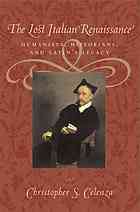

Most ebook files are in PDF format, so you can easily read them using various software such as Foxit Reader or directly on the Google Chrome browser.
Some ebook files are released by publishers in other formats such as .awz, .mobi, .epub, .fb2, etc. You may need to install specific software to read these formats on mobile/PC, such as Calibre.
Please read the tutorial at this link: https://ebookbell.com/faq
We offer FREE conversion to the popular formats you request; however, this may take some time. Therefore, right after payment, please email us, and we will try to provide the service as quickly as possible.
For some exceptional file formats or broken links (if any), please refrain from opening any disputes. Instead, email us first, and we will try to assist within a maximum of 6 hours.
EbookBell Team

4.4
62 reviewsProduced between the mid-fourteenth and the early sixteenth centuries by major figures such as Leonardo Bruni, Lorenzo Valla, Marsilio Ficino, and Leon Battista Alberti, as well as minor but interesting thinkers like Lapo da Castiglionchio the Younger, this literature was initially overlooked by scholars of the Renaissance because they were not written in the vernacular Italian which alone was seen as was the supreme expression of a culture. This lack of attention, which continued well into the twentieth century, has led interpreters to misread key aspects of the Renaissance. Offering a flexible theoretical framework within which to understand these Latin texts, Celenza explains why these "lost" sources are distinctive and why they are worthy of study.
What will we really find among the Latin texts of the Renaissance? First, Celenza contends, there are a limited number of intellectuals who deserve a place in any canon of the period, and without whom our literary and philosophical heritage is diminished. Second, and more commonly, this literature establishes the intellectual traditions from which such well-known vernacular writers as Machiavelli and Castiglione emerge. And third, these Latin texts may contain strands of intellectual life that have been lost altogether. A groundbreaking work of intellectual history, The Lost Italian Renaissance uncovers a priceless intellectual legacy suggests provocative new avenues of research.